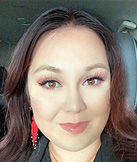
Marika Schalla – Waabishkaanakwad Ikwe (White Cloud Woman)

- Home Community:
Winnipeg, Manitoba and Saint, Laurent, Manitoba - Cultural Identity:
Red River Métis/Anishinaabe - Current Position:
Early Years Teacher at Niji Mahkwa School in Winnipeg - Education/Training:
Bachelor of Science in Biology Bachelor of Education
Post Baccalaureate Diploma in Education (Indigenous Knowledges) - Roles/Responsibilities:
I currently teach Grades 1 and 2 at Niji Mahkwa School, an Indigenous school in Winnipeg’s North End. At my school, I am responsible for our school’s Truth and Reconciliation Committee, while also helping on other committees such as literacy and school events. I also facilitate workshops for our staff at my school and on a divisional level. I am a member of the Winnipeg School Division’s Professional Network of Indigenous Educators.
“You can do it no matter the obstacles you face. You are important and will achieve so much good in your life. Your ancestors are watching you and are proud of each strive you make.”
What obstacles did you face and how did you overcome them?
There have been many obstacles and barriers in my life that I’ve had to overcome. Even though I grew up with lots of love, the intergenerational trauma was strong. From a young age, I had to grow up fast to take care of my family. My dad became very sick and a tetraplegic when I was thirteen. I had to help my mom take care of my brother and the household. At the age of seventeen, I welcomed my first son into my life, a month before my Grade 12 year started. Knowing that my baby deserved a good life, I worked hard and continued with school. I graduated on time, with Honours in 2013 from Tec Voc High School. Since then, I went on to complete a BSc, BEd, and soon a PBDE, not without my own significant challenges and barriers, such as financial troubles, mental health issues, and not knowing how I would pay for my school. I have found solace in my culture. I cope through smudging and ceremony, while connecting to my community and knowing when to ask for help from my friends and family.
What or who inspired you to really go after the profession you are in now?
The biggest inspirations in my life are my children. They inspire me to work hard and to live Mino Biimadiziwin. All the work I do is for them, and all the other Indigenous children like them. Another person who inspired me to go into this profession was my high school biology teacher. After I had my first son, it felt like it did not matter if I had high grades or the best intentions, I was only seen as a teen mom, until I met her. She showed me true consideration for my learning and my future. She advocated for me when I truly needed it and helped me discover my passion for science and teaching and helped me get into university. We still talk to this day, and I still thank her to this day for being the teacher I always needed and showing me how to be a good teacher.
What critical choices or decisions did you make that helped you get where you are today?
I moved out of my mom’s home at a fairly young age to establish a sense of independence. While I have struggled thus far on my journey, I would not be where I am today without those hardships I have faced. It was not easy being a young mother and student but I’ve always known this was the journey that was set forth for me.
Message of Encouragement:
I am so grateful to be able to share my story and hopefully inspire other Indigenous youth like myself to achieve their goals one day, and to reassure them that they can do it. “You can do it no matter the obstacles you face. You are important and will achieve so much good in your life. Your ancestors are watching you and are proud of each strive you make.”


